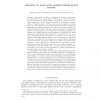Free Online Productivity Tools
i2Speak
i2Symbol
i2OCR
iTex2Img
iWeb2Print
iWeb2Shot
i2Type
iPdf2Split
iPdf2Merge
i2Bopomofo
i2Arabic
i2Style
i2Image
i2PDF
iLatex2Rtf
Sci2ools
123
click to vote
CORR
2008
Springer
2008
Springer
Learning to rank with combinatorial Hodge theory
Abstract. We propose a number of techniques for learning a global ranking from data that may be incomplete and imbalanced -- characteristics that are almost universal to modern datasets coming from e-commerce and internet applications. We are primarily interested in cardinal data based on scores or ratings though our methods also give specific insights on ordinal data. From raw ranking data, we construct pairwise rankings, represented as edge flows on an appropriate graph. Our rank learning method exploits the graph Helmholtzian, which is the graph theoretic analogue of the Helmholtz operator or vector Laplacian, in much the same way the graph Laplacian is an analogue of the Laplace operator or scalar Laplacian. We shall study the graph Helmholtzian using combinatorial Hodge theory, which provides a way to unravel ranking information from edge flows. In particular, we show that every edge flow representing pairwise ranking can be resolved into two orthogonal components, a gradient flow...
CORR 2008 | Education | Global Ranking | Ranking | Ranking Data |
| Added | 10 Dec 2010 |
| Updated | 10 Dec 2010 |
| Type | Journal |
| Year | 2008 |
| Where | CORR |
| Authors | Xiaoye Jiang, Lek-Heng Lim, Yuan Yao, Yinyu Ye |
Comments (0)

